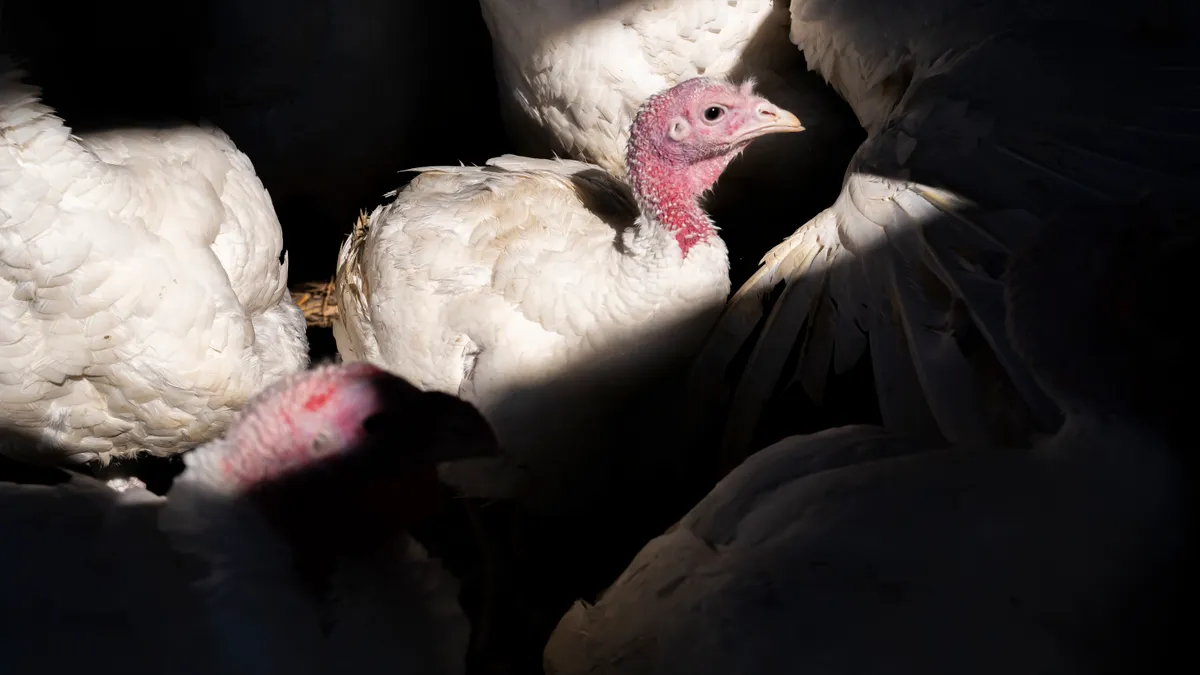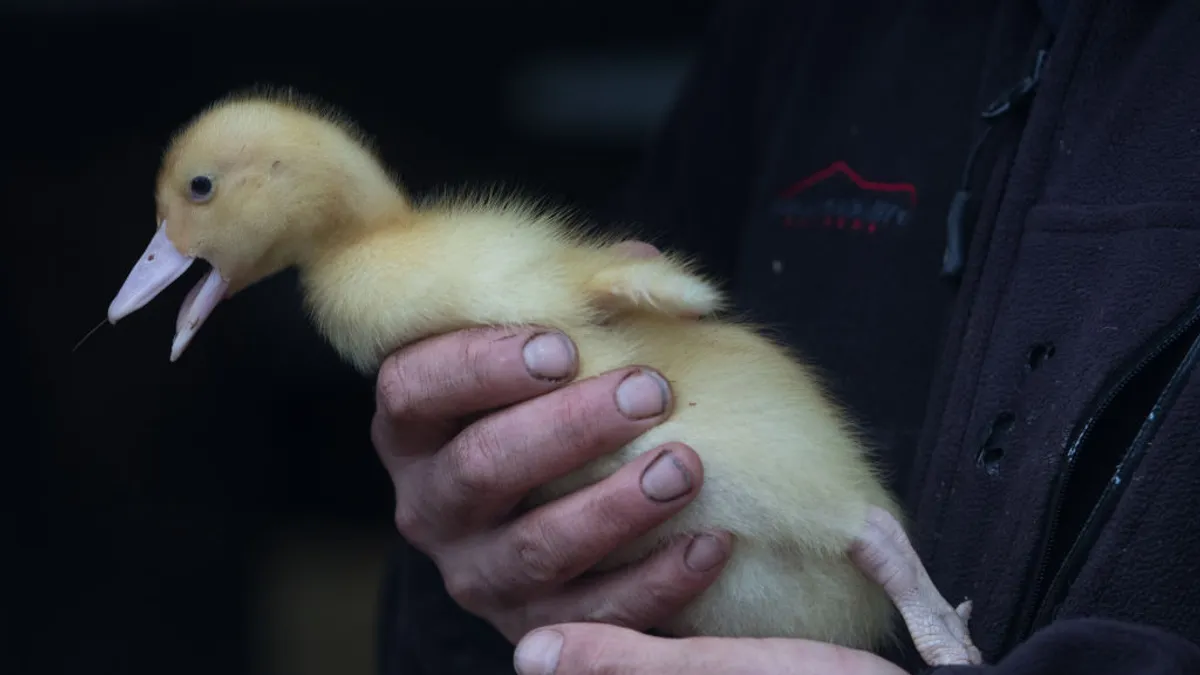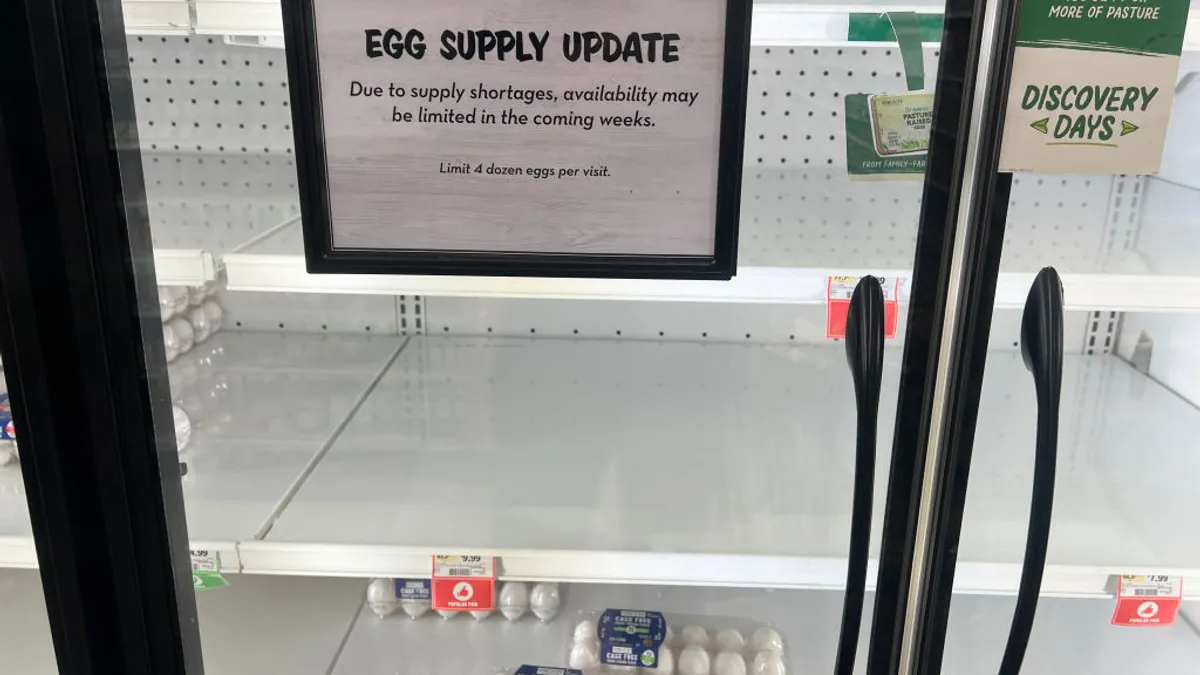This is part of a new series at Food Dive of Q&A’s with iconoclasts in the industry doing interesting things and challenging the status quo in the food industry. This interview has been edited for clarity and brevity.
Name: Elizabeth Gutschenritter
Where do you live: Wichita, Kansas
Occupation: Managing director of alternative protein at Cargill
Though Cargill has a rich and storied history in the food space, the company showed that it’s not afraid to embrace new food technologies and interests with the creation of an alternative protein division in 2019. Then, they appointed 17-year company veteran Elizabeth Gutschenritter to head it.
Gutschenritter sees the alternative protein space as a complement to animal-based protein, not a replacement. Though it is still a nascent category, Gutschenritter believes her expertise in animal protein, as well as her belief in the impact alternative protein can have, will allow her to take the newly formed division to the next level.
From heading the North American retail beef business to now the alternative protein category, Gutschenritter has gone from strategizing in a space she was two decades experience in to navigating start-up tactics in the growing alternative protein space.
The Cargill executive discussed leadership style, the challenging hurdles of a new industry and juggling family life through it all.

FOOD DIVE: What was your first job?
ELIZABETH GUTSCHENRITTER: My first job was as a cashier at Target and I was hired on my 16th birthday. I remember my mom made me a great breakfast that morning, and then told me to come back home with a job. She promised we’d celebrate that night – my birthday and my entry into the workforce. The neighborhood Target was hiring and doing open interviews. So just like mom asked, I came with a job and have been working ever since.
FOOD DIVE: What inspired you to focus on your current work?
GUTSCHENRITTER: I started my career with Cargill on the animal protein side, and spent nearly two decades immersed in that business. But when the opportunity arose to take the helm of Cargill’s newly formed alternative protein group, I jumped at the chance.
People are sometimes surprised when I say this, but our alternative and traditional protein businesses are highly complementary. They reflect our inclusive approach to the future of protein and ambition to deliver the best protein to the most people.
Fortunately, I also love a challenge, because consumer expectations are driving innovation and evolution of the alternative protein category. Our customers are looking to us for solutions, and we are partnering to propel the category forward. There’s so much innovation happening in this space.
FOOD DIVE: What is the biggest change you have seen while working in your current role?
GUTSCHENRITTER: Alternative protein is still a young and fast-changing category, and its evolution and volatility have been a big change. In a few short years, we’ve seen rapid improvement in technology and noticeable changes in consumer choices, too. All of this indicates that we’re still in the very early years of this developing category.
These patterns – new entrants, an influx of product offerings and players, competitive rationalization – are an expected part of the category’s evolution as it continues to grow.
But here’s the key. As an industry, we must unlock growth opportunities across all protein types so we can provide for a better future where protein is accessible for all. This idea is certainly central to Cargill. It’s what we do as a food company and has stood the test of time amid ever-evolving consumer expectations.
FOOD DIVE: What was harder than you thought it would be? What was easier?
GUTSCHENRITTER: Sometimes it feels like it's all hard! But seriously, I would say switching gears from working in mature Cargill businesses to a startup mentality and operating as that within Cargill.
I’ve worked here for almost 20 years and always in protein, so I spent the first 17 years or so in the traditional protein space. I most recently led our retail beef business for North America before leading our Alt-Protein team. It’s a big shift to think about working in a very mature category for almost two decades, then pivot and operate as a start-up within Cargill for the past few years. What’s interesting is that there are challenges on both sides – they’re just very different.
As an accelerator within Cargill, we have the opportunity to move with speed and agility, staying very close to customers and the market. But that comes with a heightened demand to make the case for change – along with more stakeholder management to bring others along on the same innovation journey.
Nurturing a start-up mentality within Cargill required a shift in thinking, but what made it easier was the people – both those who joined our Alt Protein team and those from the broader Cargill organization. We have worked together with a shared vision of feeding the world, and that gives us a unique perspective and advantage.
When Cargill formally launched the alternative protein group back in 2019, we had a vision for the possibilities, but we also knew there was a lot of work ahead, to establish ourselves in the category. What made the challenge so compelling to me is that we have some of the brightest minds who are truly excited about the future of food. Their grit and determination make it easier and fun to build a business within Cargill.
FOOD DIVE: What is the misconception that people have about you when they first meet you?
GUTSCHENRITTER: That I have it all together. I’m a working mom who is fully engaged in my career, and my husband works and travels as much as I do. I have always been a very organized person, so it appears on the outside that I’m ‘doing it all’ and keeping everything in balance. But the reality is I married a wonderful man that shares in all of our household responsibilities, I have two really great kids, and this strong circle of family and friends.
It's a huge plus that I live and work in my hometown where I get a ton of support from my mom and mother-in-law. I joke that we’re the equivalent of three full time adults raising two children, but it’s not far from the truth.
FOOD DIVE: What do you think will be the biggest change in the industry in ten years?
GUTSCHENRITTER: Global protein consumption will continue to grow. Filling that demand will take animal, plant-based, fermentation-derived, cultivated, hybrids and perhaps even innovations still to come. It represents a huge challenge, but one that I believe our industry will meet.
As part of that, at some point, the term “alternative protein” will become obsolete, as the category becomes just another protein option that provides consumers important nutrients and more choices, alongside traditional animal protein.
Achieving that milestone means that over the next 5-10 years, we’ll need plant-based meat alternatives and technologies suited to production at scale, like mycoprotein and precision fermentation, to drive the accessibility of the alternative protein category.
FOOD DIVE: What do you wish someone would have told you about your current role when you started?
GUTSCHENRITTER: I understood partnerships would be important, but for the work I’m doing now, they are absolutely critical – both internally and externally. To create lasting impact, innovation must scale. And to scale the alt-protein category, we need to improve eating experience, cost, and the health and sustainability of the products.
This is going to take innovative partnerships – both externally and internally. Because Cargill touches the entire value chain, we are uniquely positioned to build the broader ecosystem and help advance this category. We’re tapping into our extensive network to strategically connect those passionate about pushing the envelope on taste, cost, and sustainability with experts in supply chain, ingredient sourcing, manufacturing and operations, and go-to-market experience.
Externally, we know we’ll make the biggest advancements by working together as an industry, from partnering with technology leaders to scale production to working alongside industry peers by supporting university and public research on the nutrition of these products.
FOOD DIVE: What would be the foods of your last meal?
GUTSCHENRITTER: It would be an eclectic last meal for sure, bringing together all of my favorites. I think I’d start with a curry from my favorite Thai restaurant, followed by a street-style taco, made with our plant-based chorizo crumbles. I can’t have a taco without fresh tortilla chips and my mom’s famous homemade salsa, made with fresh-from-the-garden tomatoes. From there, maybe I’d swing by McDonalds one last time for a breakfast burrito and a Coca-Cola, and as the finishing touch, end the meal with an ample serving of chocolate fudge brownie.




















